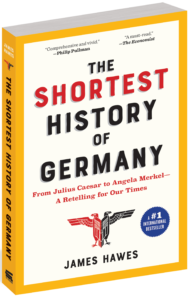How much do we really know about Germany? Many might agree that their knowledge of German history is insufficient at a time when populism is rising in Europe, and many are hoping that Germany can help preserve (and restore) liberal democracy in the West.
Now The Shortest History of Germany by international bestselling author James Hawes expertly summarizes 2,000 years of German history, offering essential insight into the country’s past— from the importance of The River Elbe and the history of the country’s Eastern-Western divide, to Germany’s unification, and how The Third Reich fits into their history.
We’ve spoken with James Hawes about what prompted him to write his new book, what everyone should know about German history and how past—even ancient —events still shape the country today.
Q: What is the single most important thing a reader should understand about German history?
James Hawes: That when Russian and US troops met up at the River Elbe in 1945, it was the natural culmination of German history. If you look at maps, and lay them over German history, you find the River Elbe was always the place that split western from eastern Germany, ever since the Romans.
Q: How did you come to write this book?
JH: I’d just run an exhibition in an important museum in Germany, and a publisher I didn’t know called my agent about doing a very short history of Germany. That was Spring 2015: before Angela Merkel’s immigration crisis, before Brexit, before Trump! Everything seemed so simple. By the time the book was finished, everything had changed.
Q: What are the most common misunderstandings about German history?
JH: The most common misunderstanding is that Germany was unified 1871. All the schoolbooks say this. It wasn’t. It was defeated in war by Prussia in 1866, and the “unification” was just the inevitable consequence of that. This leaves the other great misunderstanding, which is that Berlin is the “natural” capital of Germany. It isn’t. At the time of the US Civil War, virtually nobody in Germany imagined that Berlin would ever be the capital. It was always meant to be Frankfurt. But then Prussia won.
Q: How has the German reunification of 1989 impacted both modern Germany and Germany’s current global standing?
JH: Reunification was pushed through far more quickly, and with less thought, than anybody expected at the time. It means that Germany is bigger, yes; but it also means that it now has new borders to the east, and new burdens for the taxpayer in the rich West. The Westerners have had to ship over $2 trillion to the old east since reunification, and it really doesn’t seem to have worked. This has made them far less willing to open the coffers when Western Europe needs it. And the whole logic—of saying that the eastern Germans (excluding all ex–Warsaw Pact nations) should get immediate access to the EU and to Western currency—is a nationalistic one. The old West Germany was maybe the least nationalistic state in history, and people saw it as an ideal neighbor, but the reunification has put that in doubt. And, of course, it has severely skewed German politics toward the right.
Q: Your book contains over 100 maps—why are maps so important to German history?
JH: Maps are important to most of history. By showing Germany’s history like this, I hope to drive home the point that what we call “Germany” today is a country that’s actually divided—and always was—by a geographical line as vital as (and much older than) the Mason–Dixon line in America. We need to get used to seeing German politics in this way: with blue and red states, and an ancient division
Q: What created this East-West split in Germany?
JH: Like so much of European history, it’s all about how far the Romans got. They were the ones who decided that the Elbe should be the limit.
Q: Hold on, didn’t the Roman Empire stop at the Rhine?!
JH: We only think that because Prussian historians told everyone so. In 9 CE, three Roman legions were wiped out east of the Rhine, but that wasn’t (as everyone thinks) the end. Almost all the major cities of Germany today were within the Roman Empire of 150 CE.
Q: Even Berlin?!
JH: No, and that’s the whole point! Berlin didn’t become a German city at all until around 1200 CE. That’s 1,200 years after Cologne was founded as the Roman capital of Germany.
Q: Who lived in Berlin before that?
JH: Slavs. The whole of what we now call eastern Germany was completely free of Germans until 1147 CE. Until then, it was Slavic pagan country.
Q: But this was so long ago, do you really think it still affects us?
JH: The year 1492 was a long time ago, but what happened during the colonization of America still seriously affects the whole American continent as we know it now. The year 1169 was a long time ago, too—that’s when the British first invaded Ireland—and if you think that doesn’t matter today, try going to Northern Ireland.
Q: But how can ancient events have such a lasting effect?
JH: Here’s the thing: In 2015, I stood by the banks of the Rhine, talking to a very elderly German Countess who told me stories she’d heard from her grandfather, about what Bismarck said to him in 1870. That’s 145 years of human history, linked by single generation. Fifteen steps like that—think of it as a queue in an airport check-in—and we are back at the birth of Jesus Christ. History is far, far closer than we think, and stories leap the generations very easily.
Q: So how does the Third Reich fit in? Do you consider that an aberration in German history?
JH: The whole period of 1870 to 1945 is not German history at all. It’s Prussian history. Germany wasn’t “united.” It was conquered by Prussia, which was always a completely different place.
Q: And now?
JH: The Germany we knew until 1989 was actually the real Germany. Unfortunately, the so-called “reunification” has bought the East-facing Germany back—along with its politics. The Germans need to have the confidence (and Europeans and Americans need to have the trust) to understand that this “other” Germany mustn’t be allowed to deform the real Germany once again.
Q: If the Third Reich actually belongs to Prussian history, how does Germany fit in? Where do we place Germany within World War II?
JH: By the beginning of World War II, the Germans had forgotten their own history; which contained long and serious resistance to Prussian, and later Nazi, absolutism. It’s a terrible lesson about what can go wrong in a country when it starts to believe a falsified version of its own story.
Q: In the foreword to your book, you write that Germany “may now be our last hope”—can you explain? Why is Germany so important at this moment in time?
JH: If Western democracy fails in Germany, it fails in Europe. With the British leaving Europe, and the US president seeming very ambivalent about NATO; if Germany doesn’t step up to the plate, Russia is unchallenged in Europe.

James Hawes studied German at University of Oxford and University College London, then held lectureships in German at the universities of Maynooth, Sheffield, and Swansea. He has published six novels with Jonathan Cape. Speak for England (2005) predicted Brexit; it has been adapted for the screen by Andrew Davies, though not yet filmed. His last book, Englanders and Huns, was shortlisted for the Political Books of the Year Awards in 2015. He leads the MA in creative writing at Oxford Brookes University.


